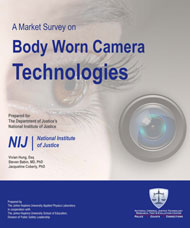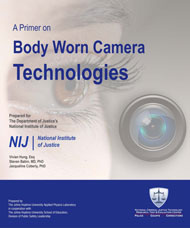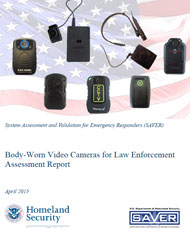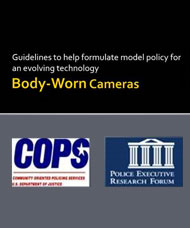One key policy area involves activation–when are officers required to turn on the camera? Departments have varied considerably on this issue, from very broad policies that require recording every law enforcement–community member contact to highly discretionary policies. One study indicates that activation policy has a significant impact on how often cameras are used. The Mesa (AZ) Police Department employed two different administrative policies during its evaluation period. For the first six months, the policy was very restrictive and gave officers little choice regarding camera activation. During the second six months, the policy was more discretionary. During the first six months (with the restrictive policy), the 50 camera-wearing officers averaged 2,327 video files per month. During the second six-month period (with the less restrictive policy), the same 50 officers averaged 1,353 video files per month–a 42% decline in camera activations (Mesa Police Department, 2013).
The Police Executive Research Forum (PERF) has taken the position that recording every encounter with the public would create too many opportunities to violate privacy rights and hinder positive communication between law enforcement and members of the public. PERF identified a number of problem areas, including interviews with crime victims, intelligence-gathering interviews with confidential informants, and simple casual encounters with residents in a neighborhood. Results from the PERF surveys and interviews also indicated that most departments allow for some degree of officer discretion. "Of the police departments that PERF consulted, very few have adopted the policy of recording all encounters with the public. The more common approach is to require officers to activate their cameras when responding to calls for service and during law enforcement-related activities, such as traffic stops, arrests, searches, interrogations, and pursuits." (PERF, 2014: 13)A department’s policy should clearly articulate when officers are required to record, when they can exercise discretion, and when they are prohibited from recording (e.g., interactions with colleagues during routine activities, during strip searches of suspects, and during conversations involving tactics or strategy). Most departments also require an officer to explain why he or she decided to not record an encounter. The policy may also state that an incident may not be recorded if doing so is impractical, impossible, or unsafe for the officer or other community members. Officers should also document in the official report when a video does exist.
A related key policy area is when officers should turn off the camera. Many departments have policies that state an officer can deactivate the body-worn camera (BWC) only at the conclusion of the encounter, and some also require supervisor approval for deactivation. PERF recommends that an officer continue to record the encounter until the incident is over, the officer has left the scene, or a supervisor has approved the deactivation. The officer should announce that the recording is being terminated prior to deactivation.
A department’s policy should also clearly indicate what will happen to an officer who fails to activate a camera in circumstances where activation is required. Will the officer be subject to discipline? If so, how will he or she be disciplined? The consequences for failure to activate as well as premature deactivation should be clearly stated. Several departments have developed a strategy where, for some preliminary period of time (e.g., six months), officers are not disciplined for failure to activate. During that preliminary or pilot period, agency leaders highlight the importance of activation in accordance with department policy and actively advertise that the discipline policy will change after the pilot period ends.
Lively conversation took place at the February 2015 Bureau of Justice Assistance BWC Expert Panel around this topic. Some notable examples include privacy comments from the American Civil Liberties Union (ACLU) and Cato Institute, labor organization comments from the Hispanic National Law Enforcement Association and Hispanic American Police Command Officers Association, and victim issues raised by the Baltimore Child Abuse Center.
Jay Stanley from the ACLU suggested, "there needs to be clear policies and clear expectations of line officers when they record and clear consequences when they don’t follow those policies." Matthew Feeney of the Cato Institute emphasized the need for specific third-party policy citing two examples: "if the policy states that footage is released when it is not part of an investigation, under what circumstances individuals can ask for information to be held?" and, "if a community member walks past an officer and is captured on video, can that community member ask for the video to be redacted?"
Asserting that officers need room for discretion when electing to turn cameras on and off, Michael Rubin from the Hispanic National Law Enforcement Association stated, "if officers don’t have the ability to make this decision, they will record locations, events, and moments in time that should not be preserved for public consumption. Society gives law enforcement officers the discretion to determine when to use a weapon, but we’re wondering if those same officers are able to exercise sufficient judgment about when to turn on or off a video camera? For example, an officer walking into peoples’ homes should not be obligated to record where valuables are stored or document photographs of their children. Nor, should recordings of business security measures or data storage equipment be allowed to enter the public domain. Such video would only be used by criminals to case targets for future crimes or to allow the morally bankrupt of our society to immortalize people at their most emotionally vulnerable state. The result being, that the police would become secondary victimizers."
Lieutenant Daniel Zehnder, Las Vegas (NV) Metropolitan Police Department (LVMPD), explained, "the LVMPD camera turn on/off policy is very detailed. Officers are required to state, while on camera, why the video is being turned off–for example, an officer may turn off the camera if a child enters into the video/scene." Adam Rosenberg of the Baltimore Child Abuse Center then explained, "video technology is used for children interviews by social workers and this footage is used for conducting peer reviews. This could be an analogy for BWC. It would be great to do a peer review of regular policing to improve outcomes."
For more information, see:






